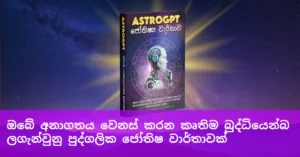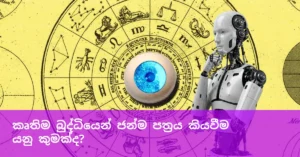සිහින පලාපල – ඔබගේ සිහින වල තේරුම දැනගන්න
Table of Contents
රාත්රී යාම හා සිහිනවල පරිකල්පනාව – පංච පක්ෂී සහ ජ්යොතිෂ්ය විචාරය
සිහින විමර්ශන ශාස්ත්රය අනුව, සිහින පහක් වූ ප්රභේද — ධාතු ප්රකෝප සිහින, අනුභූත පූර්ව සිහින, දේවතෝපසංහාර සිහින, පූර්ව නිමිත්ත සිහින සහ මිශ්ර සිහින — වශයෙන් වර්ග කිරීමක් සිදු කර ඇත.
පංච පක්ෂීන්ට අනුකූලව රාත්රී යාම පදනම් කරගෙන, ජ්යොතිෂ්ය සෘෂිවරුන් සඳහන් කරන්නේ විවිධ යාමවල දී දැක්වෙන සිහින සංකේතාත්මකව වෙනස් වේලාවකදී සැබෑ විය හැකි බවයි.
පළමු යාමය වන ප.ව 6.00 සිට රාත්රී 8.24 දක්වා කාලය තුළ දැක්වෙන සිහිනයක් වසරක් ඇතුළත සැබෑ විය හැක. දෙවන යාමය — රාත්රී 8.25 සිට 10.48 දක්වා — අතර දැක්වෙන සිහින, මාස 8ක් ඇතුළත සිදුවිය හැකි බව විශ්වාස කෙරේ.
තෙවැනි යාමය වන රාත්රී 10.49 සිට පාන්දර 1.12 දක්වා සිහිනයන් සඳහා මාස 3ක පමණ කාලයක් සදහන් වේ. සිව්වැනි යාමය — පාන්දර 1.13 සිට 3.36 දක්වා — දැක්වෙන සිහිනයක් මාසයක කාලයකින් සැබෑ වීමක් දක්වන බවයි.
පස්වන යාමය, පාන්දර 3.37 සිට උදෑසන 6.00 දක්වා, දැක්වෙන සිහින ඉතා ඉක්මනින් සැබෑ වීමේ හැකියාවක් ඇති බව පූර්වාචාරීන් පෙන්වා දී ඇත.
එසේම, ශ්රී පංචායුධ ජ්යොතිෂ සේවා සිදුකරන විමර්ශනවලදී දක්වනු ලබන්නේ, සියලුම සිහින පෙර නිමිත්තක් ලෙස සලකිය නොහැකි බවයි — එනම්, සෑම සිහිනයක්ම අනාගත සිදුවීමකට සෘජුවම සබඳ නොවිය හැක.
According to the science of dream analysis, dreams are categorized into five types — Dhatu Prakopa dreams, Anubhuta Poorva dreams, Devathopasamhara dreams, Poorva Nimitta dreams, and Mixed dreams.
Astrological sages, based on Pancha Pakshi, state that dreams seen during different night segments (yaama) carry different symbolic meanings (sihina palapala) and are believed to come true within varying timeframes.
A dream seen during the first segment (from 6:00 PM to 8:24 PM) is believed to become reality within a year. In the second segment (8:25 PM to 10:48 PM), dreams may come true within about 8 months.
The third yaama, from 10:49 PM to 1:12 AM, relates to dreams that may be fulfilled within approximately 3 months. The fourth segment (1:13 AM to 3:36 AM) is believed to indicate realization within about a month.
In the final segment, from 3:37 AM to 6:00 AM, dreams are said by ancient astrologers to come true very soon.
Furthermore, research by Sri Panchayudha Jyothish Services highlights that not every dream should be interpreted as a predictive signal — in other words, not all dreams serve as omens of future events.
සිහින යටි සිතේ ජනනයක්ද, පූර්ව නිමිත්තක්ද? - Sihina palapala
සිහින යනු ඔබේ භෞතික ශරීරය නිදා සිටියදී, යටි සිතෙන් උත්පාදනය වන සංවේදී හා සජීවී අත්දැකීමකි. සංස්කෘත භාෂාවෙන් “ස්වප්න” ලෙසත්, පාලි භාෂාවෙන් “සුපිනි” ලෙසත් මෙය හඳුන්වනු ලැබේ.
වෛද්ය විද්යාව අනුව, සිහින දැකීම යනු උඩු සිත සහ යටි සිත අතර සිදුවන විශේෂ ක්රියාවලියක ප්රතිඵලයක් ලෙස සලකා බලයි. කෙසේවෙතත්, බෞද්ධ සාහිත්යය තුළ සිහින සංකේතාත්මක හා පූර්ව නිමිත්තමය අරුත් සහිතව දැක්වෙයි.
මේ සඳහා පැරණිතම උදාහරණයක් වන්නේ මහාමායා දේවිය දුටු සුපිනියයි. ඇයගේ දකුණු පැත්තෙන් කුස තුළට ඇතුළත් වූ සුදු නෙළුම් මලක් හොඳෙන් ගත් සුදු ඇත් පැටවෙකුගේ සිහිනය බමුණන් විසින් බෝසතාන් වහන්සේගේ උපතේ පූර්ව නිමිත්තක් ලෙස විවරණය කරනු ලැබීය.
එමෙන්ම, බුදුවෙත පිවිසීමේ පෙර රාත්රියේ බෝසතාන් වහන්සේ දුටු සිහින 5 ද, උන්වහන්සේගේ බුදු බව තහවුරු කළ පූර්ව නිමිත්ත ලෙස සලකන ලදී.
අතිරේකව, මන්ත්රී දේවිය සහ කොසොල් රජතුමා දුටු සිහින ද බුද්ධ ඉතිහාසය තුළ දැක්වෙන පුරාවෘතවලින් දැක්විය හැකි විශේෂ සිහින වේ.
ශ්රී පංචායුධ ජ්යෝතිෂ් සේවාව මගින් පෙන්වා දී ඇත්තේ, මේ සියල්ලම ජීවිතයේ සැබෑ සිදුවීම්වලට සබැඳි වූ පූර්ව නිමිත්ත සිහින ලෙස පුරාණ සම්ප්රදායන් තුළින් හඳුන්වන උදාහරණ බවයි.
A dream is a vivid and emotional experience generated by your subconscious mind while your physical body is asleep. In classical literature, dreams are referred to as “Swapna” in Sanskrit and “Supini” in Pali.
From a medical perspective, dreaming is considered a result of some process that occurs between the conscious and subconscious mind. However, in Buddhist literature, dreams also hold symbolic meaning.
One such ancient reference is the dream seen by Queen Mahamaya, in which a white elephant carrying a white lotus in its trunk entered her womb through her right side. This dream was interpreted by Brahmins as a sign of the Bodhisattva’s conception and the coming of a great being.
Another example is the five dreams seen by the Buddha-to-be the night before attaining enlightenment, which were believed to confirm his future Buddhahood.
In addition, dreams seen by Queen Mantani and King Kosala are some of the traditional stories found in Buddhist historical texts, which give insights into the cultural importance of dreams.
According to Sri Panchayudha Jyothish Services, these are some of the oldest examples of Poorva Nimitta Dreams — prophetic dreams — that connect symbolic visions to real events in life which is called as sihina palapala.
සිහිනවල බලපෑම් හා ඒවායේ සඵලතාවය පිළිබඳ සත්යතා
සිහිනයක් දැකීමෙන් පසුව එය නැවත නැවත මතක් කිරීම හෝ ආවර්ජනය කිරීම සිහිනයේ බලපෑම අඩු කරයි.
එසේම, සිහිනයක් දැකීමෙන් පසු කලබල වීම අසුබ සිහිනකට අදාල ප්රතිඵල වේගවත් කිරීමකට හේතු වේ. සුභ සිහින සඳහාද එය වලංගු වන අතර, එම සුබ ප්රතිඵල සැලසේ යුතු අවස්ථාවන් අහිමි විය හැකිය.
එබැවින් හොඳ හෝ නරක වශයෙන් ව්යක්ෂ්ය වන කුමන සිහිනක් දැකුණත්, කිසිදු අවස්ථාවක කලබල වීමෙන් වළකිය යුතුය.
කෙසේවෙතත්, සිහිනක සුභ අසුභ තේරුම තෝරා ගැනීම සරල දෙයක් නොවන අතර, එය ප්රහේළිකාවක් තෝරන ආකාරයක් වේ.
එවන් තේරුම් තෝරා ගැනීමේ හැකියාවක් නොමැතිනම්, ඒ පිළිබඳ දැනුම සහිත අයෙකුගෙන් උපදෙස් ලබාගත යුතුය.
මධ්යසාර භාවය පවතින විට, අඩ නින්දේදී, හෝ දවල් කාලයේ දකින්නට ලැබෙන සිහින ප්රතිඵල ලබා දෙන සිහින ලෙස නොසලකන ලදී.
අධික උණුසුම් හෝ සීත කාලවල දක්නට ලැබෙන සිහිනද, වා, පිත්, සෙම් ආහාර ගැනීමත් සමඟ ඇතිවන බහුබූත සිහිනද එසේමයි.
එසේම, උනන්දුවෙන්, කැපවීමෙන් හා උත්සාහයෙන් සිත තුළ මවා ගන්නා සිහින සැබෑවක් බවට පත් කළ හැකිය.
බොහෝවිට රාත්රි කාලයේ දකින සිහින සඵල වීමට වැඩි හැකියාවක් තිබෙන අතර, දවල් කාලයේ දකින සිහින ව්යර්ථ වෙයි.
Repeatedly recalling or replaying a dream weakens its power. Similarly, reacting with panic after seeing a dream can accelerate the results of an inauspicious dream. Even for auspicious dreams, such anxiety can hinder the manifestation of positive outcomes.
Therefore, regardless of whether the dream is favorable or unfavorable, one must avoid becoming emotionally disturbed after experiencing it.
However, interpreting a dream’s meaning—whether good or bad—is like solving a riddle. If one lacks the strength or wisdom to do so, guidance should be sought from someone knowledgeable in this field.
Dreams seen during midday, under the influence of alcohol, or in light sleep are not considered result-yielding. Likewise, intense cold or hot weather, or consuming food that disturbs the Vatha, Pitha, or Sleshma elements in the body, can lead to excessive and meaningless dreams.
On the other hand, dreams born from strong desire, focus, and effort can be transformed into reality with dedication. Most often, dreams seen during the night have a higher tendency to manifest, while daytime dreams usually do not yield results.
සංක්ෂේපය
සිහින යනු නින්දේ දී අපේ යටි සිත විසින් ජනනය වන සංවේදී අත්දැකීම් පමණක් නොවෙයි. ඒවා බෙහෙවින් වටිනා, සැඟවුණු තේරුම් සහ අනාවැකි ගෙන එන්නක් වෙයි. නමුත්, එම සිහින වල බලපෑම, ඒවා දැක්වෙන වේලාව, අපේ චිත්ත ස්ථිති, සහ අහාර පුරුදු ආදිය මතයි. අසුබ හෝ සුභ වුවත්, සිහින වලට බිය වීමෙන් හෝ නැවත නැවත සිහිනය මතක් කිරීමෙන් පවා පලාපල වෙනස් විය හැක. විශේෂයෙන්ම රාත්රී කාලයේ දැක්වෙන සිහින වඩාත් සඵල වීමේ හැකියාවක් පෙන්වයි.
Dreams are more than fleeting thoughts during sleep—they carry meanings, warnings, and even glimpses into our future. Their power, however, can be influenced by how we react to them, the time we see them, our mental state, and even our diet. Auspicious or inauspicious, dreams should be interpreted with care and calmness, ideally by those with deeper knowledge. While not all dreams yield results, especially those seen in disturbed states, night-time dreams often hold significant value (palapala) and can sometimes manifest in our waking lives if nurtured with intention and clarity. 👉 Click here to find out your sihina palapala (සිහිනයේ පලාපලය)



